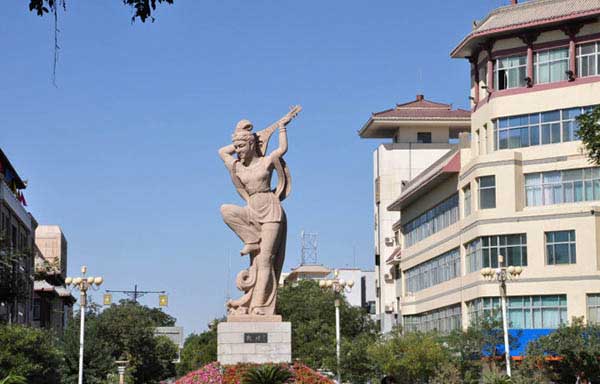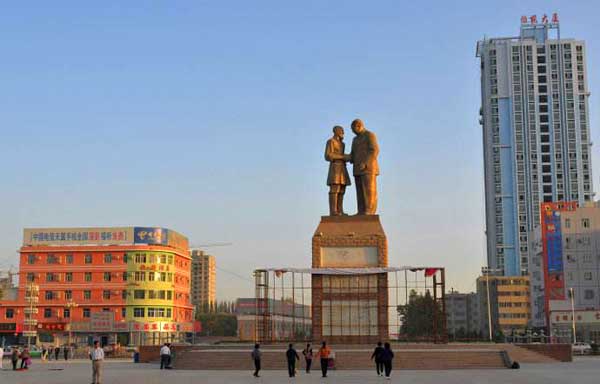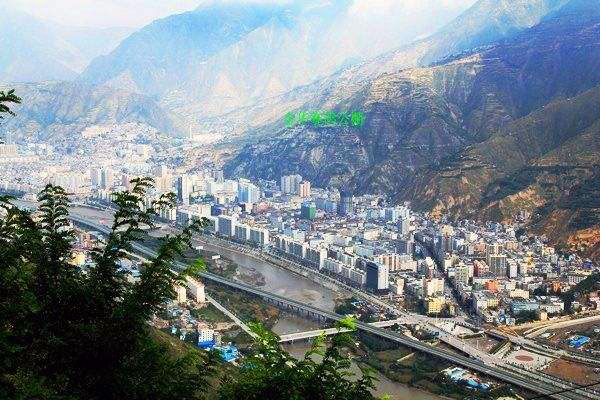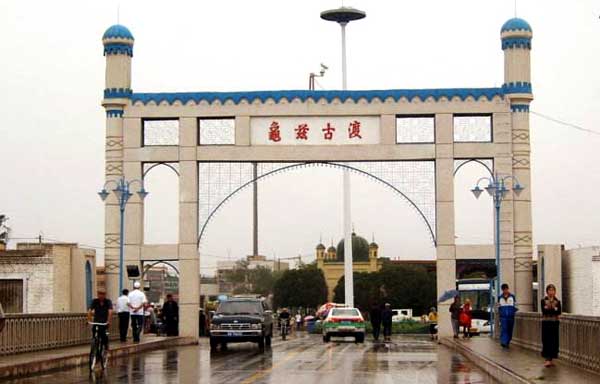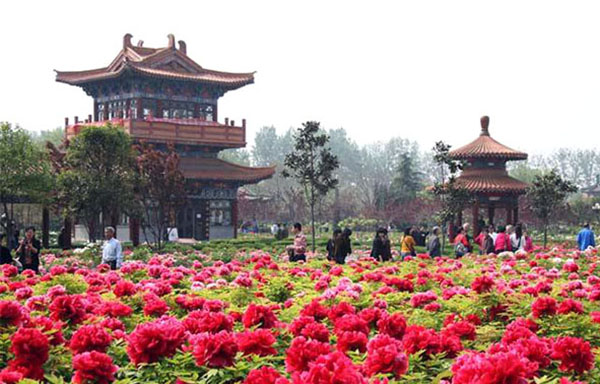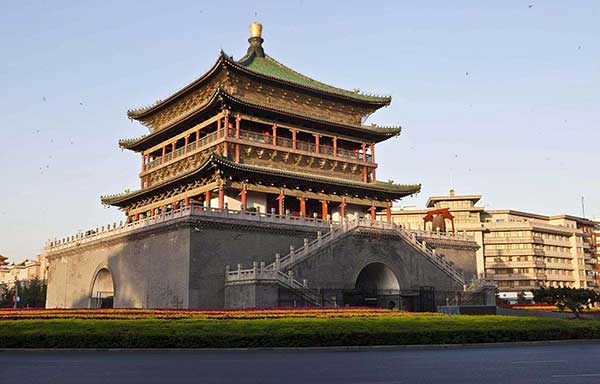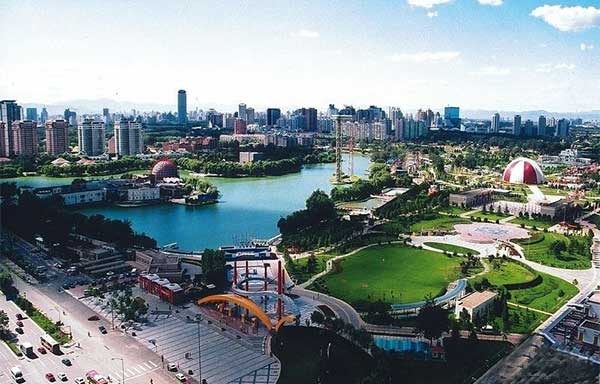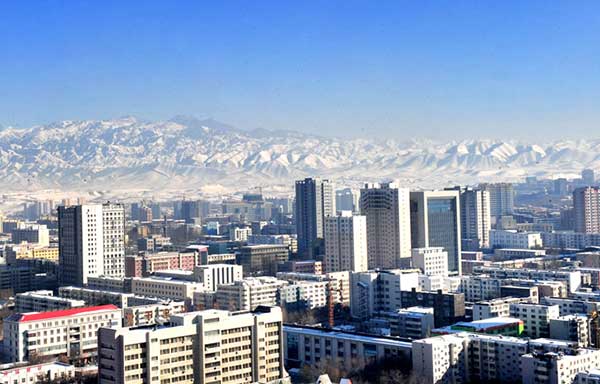- By admin
- In HistoricalFigures
- 2018-01-08
Journey to the west --- Xuanzang
"I would rather die going to the west than live by staying in the east."
- Xuan Zang
Early Life
The year was 600.
The place was Chen He (Old River) Village of Henan (South of the River).
In northern China, where the climate was cold and dry, Chen Yi was born. No one even suspected at the time that the youngest boy of this respected family would one day grow up to be the famous scholar and pilgrim, Xuan Zang.
The Chen family consisted of a long line of government officials and scholars of Confucianism. Chen Yi was also expected to follow in his ancestors' footsteps. Fortunately for all Buddhists, his father, Chen Hui, was also extremely interested in Buddhism, and studied both of these religions at home. Naturally, this was a major influence on the little Chen Yi, and when his second elder brother became a Buddhist monk at Jing Tu (Holy Land) Monastery, he also went there to practice and study Buddhism. In the same year, when he was merely six, he became a novice monk. Usually, only boys who are at least 7 years old are allowed be ordained as novice monks. However, he passed the rigorous tests, and therefore was ordained into the Buddhist order as an exception, taking on the name of 'Xuan Zang'.
From then on, he studied with his elder brother at Jing Tu Monastery. He studied both Theravada (Lesser Vehicle) and Mahayana (Greater Vehicle) Buddhism, showing a preference for the latter. 'Greater Vehicle' refers to teachings that can 'ferry' all beings towards salvation, as opposed to the 'Lesser Vehicle' teachings that focus on personal awakening or enlightenment.
From an early age, Xuan Zang's extraordinary intelligence stood out. By listening to a lecture on a scripture one single time and studying it by himself another time, he could memorize an entire scripture. This was amazing considering that each scripture consists of millions of words. His fellow monks hailed him as a genius. When his father died in 611, he and his brother continued studying at Jing Tu monastery, until political unrest forced him to flee to the city of Changan (Eternal Peace - now known as Xi An). After that, he went to Chengdu of Sichuan (Four Rivers) for further studying, growing in knowledge and reputation. At age 20, Xuan Zang was fully ordained as a Buddhist monk.
The more Xuan Zang studied, the more he was dissatisfied with the quality of the Buddhist texts available. There were many different interpretations of a single scripture, most contradicting each other. There was no one single standard version of the scriptures. This was because the translations of the Buddhist scriptures of that period were mostly done by foreign monks, from India and elsewhere. Language barriers hindered accurate translation, compounded by the fact that each translator had different understandings of the original scriptures themselves, which were inherently hard to understand. Different branches of Buddhism also complicated the process of interpretation. The followers of each branch had different views of the teachings, which were frequently disputed by members of different sects.
All these led Xuan Zang to a conclusion: In order to gain true understanding, he would have to go to the West to get the original holy scriptures.
As fate would have it, a disciple of Abbot Silabhadra (the president and highest ranking monk of Nalanda University) arrived in Changan by sea. When he knew that Xuan Zang was planning a pilgrimage to India, he told Xuan Zang: "To really understand the true meanings of the holy texts, you must go to Nalanda University and study under the Abbot Silabhadra."
Therefore, Xuan Zang fixed his goal as Nalanda University in India - the real life equivalent of the fictional Thundersound Monastery of the Western Heavens in the novel Journey to the West.
Pilgrimage
In 629, Xuan Zang was about 28 years old. It was three years after the Emperor Tang Zhen Guan ascended to the throne. The Gokturks (Eastern Turks) were constantly attacking at the western borders, therefore the government had closed down the roads to the west, prohibiting everyone except merchants and foreigners from traveling in that direction.
It was at this time of unrest that Xuan Zang and some other monks with the same goal applied for passports (known as 'guo shuo' at the time) to journey to India. The government refused to grant their request. The other monks gave up. Xuan Zang, determined to make the journey, sneaked out of Chang An. Along the way, he was stopped at Liang Zhou as he didn't have a passport. A renown Buddhist abbot helped him to slip out. He rode by night and hid by day, eventually reaching Gua Zhou. However, a government document ordering his capture arrived at the same time. Luckily, the officials there were devout Buddhists and suspended the document, letting him go.
Xuan Zang had now successfully evaded capture by the government. However, the real dangers still lay before him. Unlike in the fictional Journey to the West, the threats came not from demons, waiting to kill him and eat his flesh. The dangers the real life Xuan Zang faced were more mundane, but equally life-threatening. And as Xuan Zang left the safety of the Yu Men Guan (Gates of Jade), he stepped right into the first danger - the vast, dry Gobi Desert, with its extreme temperatures, both the scorching heat of the day and the freezing cold of the night deadly to travelers. The extreme temperatures together with the lack of water, food, and shelter made the desert a death trap for travelers of that century. Death lay along the road to the west, literally. As Xuan Zang rode his horse into the desert, a lonely, desolate figure in the shifting sands, he saw human bones, evidently the remains of travelers that, like him, had the courage to take on the challenge of the dangerous Gobi Desert without permission from the government. Unlike him, they had lost. Some of them, Xuan Zang knew, were pilgrims to the west like him.
As if the natural dangers weren't enough, there were five sentry towers in the Gobi Desert. The sentries were ordered to shoot and kill all travelers without a passport. When Xuan Zang sneaked past them, he was almost shot to death by arrows. In his efforts to evade them, he got lost and wandered for days in the Gobi Desert without water or food. He was close to death when his mount, a horse who had often traversed the desert, brought him to an oasis, which saved his life. In the 'Biography of Master Tripitaka of the Great Ci'en Monastery of the Great Tang Dynasty' by his disciples, it is recorded that on the fifth night, when Xuan Zang lay in the sand, unable to go any further, a mysterious man with the height of a giant came to him in his dreams and commanded him to get up and move! After Xuan Zang got to his feet and wandered aimlessly for some distance, his horse got excited and rushed in a certain direction, leading him to an oasis, thus saving his life. The formation of the character Sha Wu Jing (Friar Sand) was modeled after this man of Xuan Zang's dream.
After escaping certain death, Xuan Zang plodded on resolutely to Kumul, an oasis city, and followed the Chu River valley into Central Asia. He arrived at Turfan, known then as Gao Chang (Height of Prosperity) Country. The king of Turfan was a devout Buddhist who sent four novice monks and twenty five other people to journey with him, in addition to giving him letters of introduction and supplies. After they left Turfan, they had to cross a mountain of ice, the Victory Peak, also known as Mount Ling. While traversing the mountain which was covered with glaciers, one third of Xuan Zang's entourage died. The luckier ones suffered quick deaths when they were hit by great chunks of ice, broken off the glaciers by the wind. Others were buried alive by avalanches. Some, while traveling on the dangerous mountain paths, lost their footing and fell to their deaths. Others froze to death. Some fell through cracks in the glaciers, finding their resting places in coffins of ice. Yet Xuan Zang's determination to reach India did not diminish in the least. He continued to cross the Tian Shan (Celestial Mountains), and finally reached what is now known as Kyrgyzstan through the Bedal Pass.
Xuan Zang's journey to the west continued, passing various countries, visiting sites of Buddhism along the way. He arrived at the Nava Vihara (New Monastery), where he acquired the Mahavibhasa text, and studied Theravada Buddhism with the master Prajnakara. However, he was a devout advocate of Mahayana Buddhism, which preached that monks should not merely strive for personal enlightenment, as advocated by the Theravada sect, but instead, should be compassionate and help all beings to achieve salvation. His motive for studying the Theravada scriptures was not because he revered them, instead, he studied them so that he could attack the weaknesses in the Theravada teachings. After leaving, he traveled through other places until finally, he reached India through the Khyber Pass.
It took three years for Xuan Zang to reach India. For the most part, he journeyed alone. It was a miracle that he survived the deserts, the mountains of snow, the desolate plains, the heat, the sandstorms... Getting to India alive and in one piece was a great accomplishment in of itself.
India
Xuan Zang had had to undergo many hardships and obstacles in his journey to India. Even after he reached India, he still had to face the hot climate, wild animals, bandits, diseases etc. For example, in order to reach India, Xuan Zang traveled through the Khyber Pass. Not only were the roads narrow, bandits were everywhere. It was sheer luck that Xuan Zang passed through unscathed.
Historical records tell us about encounters Xuan Zang had with bandits during his journeys within India itself. Below is the first:
Xuan Zang and his party was passing through a jungle when bandits leapt out. They were bound and stripped of their clothing and belongings, then forced into a dry pond, where the bandits planned to kill them. Xuan Zang and his entourage could only wallow helplessly in the mud. Above them, the bandits began squabbling about the stolen goods. Luckily, a sharp young monk noticed that there was a small hole half hidden by rushes in the side of the pond, big enough for a person to crawl through. He silently tugged at Xuan Zang's sleeve, and taking advantage of the bandits' distraction, both of them crawled into the hole. The hole turned out to be a tunnel, and they crawled on their knees through the mud. After less , darkness gave way to light and they emerged into a village. With the villagers' help, they went back to the jungle where they had been ambushed. To Xuan Zang and his follower's immense relief, Xuan Zang's companions were unharmed, as the bandits were still fighting about the division of the spoils. Together, the villagers drove away the bandits, thus saving the rest of Xuan Zang's entourage. If it weren't for that observant young monk, Xuan Zang and his companions would surely be dead at the bottom of the muddy pond.
One of the other encounters goes like this:
Xuan Zang and his companions were navigating a river when they were accosted by bandits once again. And this time, the bandits weren't satisfied by just money. They wanted a strong, healthy human to sacrifice to their gods. And Xuan Zang fit the bill perfectly. Enthusiastically, they began setting up a temporary altar. When they finished, they pushed Xuan Zang onto the altar and began preparing to sacrifice him. However, Xuan Zang showed no signs of fear or anger, only a calm acceptance of the inevitable.
"Since you are making a sacrifice to your gods," he said to the bandits, "be patient. Let me be of service to your gods in peace." He then sat in a meditating pose on the altar and began chanting the names of the bodhisattvas, showing no signs of struggling. His desperate companions started to cry and rage, but he didn't respond.
By sheer luck, all of a sudden, a strong wind whipped up, the force breaking the trunk of a large tree on the bank. Thunder and lightning clashed in a terrible display of light and sound. Even some of the bandits' boats overturned, dumping the bandits into the river. The bandits cowered on their decks, scared out of their wits.
A courageous companion of Xuan Zang took advantage of the situation by shouting: "This man you are planning to sacrifice is the great Master Xuan Zang of Great Tang! If you kill him, you risk the wrath of the Buddha. Look!" He spread his arms. "Don't you know that you have already angered your own gods?!"
The overwhelmed bandits immediately prostrated themselves before the altar, pleading with Xuan Zang to forgive them. Xuan Zang, however, had already reached a meditative state on the altar. His eyes were closed, and nothing, not even the wind, not even the rain, could break him from his concentration. Only when the head of the bandits went onto the altar and touched him gently, calling his name, did Xuan Zang start and look up.
"Is it time for the sacrifice?" was all he said.
Such calm in the face of death and adversity. Such unwavering serenity. Truly, Xuan Zang was a holy monk. But let us return to his journeys within India.
After crossing the Khyber Pass, he arrived in Peshawar, where Buddhism had once flourished. He was greatly saddened by the sight of the once great capital of Gandhara, destroyed by war and invasions. He passed through many other places and Buddhist sites until he arrived at Kashmir. This was one of the most important centers of Buddhism, with over 5000 Buddhist monks. He stayed in the valley of the Jhelum River for two years, studying under a famous monk.
He then continued his journey, stopping at many other places. Of these, the most impressive was the great capital, Kanauji, which had 100 monasteries and over 10,000 monks of both of the Mahayana and Theravada sects. Here, Xuan Zang studied the Theravada texts.
His next stop was the homeland of the Yogacara school, on which he based the Fa Xiang school he would found later. The Yogacara school states (and so Xuan Zang believed) that only the mind truly exists, and everything else is an illusion, including the body. After that, he went around visiting sites of Buddha's life, like the place where he was born and died, before eventually reaching Nalanda University, his ultimate destination.
Nalanda University
The Nalanda University was the biggest of all the Buddhist temples in India, and the earliest university in the world. The best students of Buddhism flocked to this place, some of them from foreign countries like Xuan Zang. The head of this prestigious university, Abbot Silabhadra was more than a hundred years old. He had mastered all of the Buddhist scriptures and religious texts, so he bore the honoured title of "Zheng Fa Zang".
Zang is Chinese for the Sanskrit word pitaka, literally meaning bamboo container or basket, thus the translation of Tripitaka (or San Zang, as Xuan Zang is commonly known) as three baskets. 'Basket' actually refers to the meaning 'containing everything', obviously describing the Buddhist scriptures as 'all-compassing'. Tripitaka ithe name for a Buddhist canon of scriptures, or pitaka, which have three categories, thus the name tri-pitaka. A person who has mastered and understood the meanings of every single Buddhist scripture is honoured with the title "Zheng Fa Zang". Next, a person who has mastered at least fifty of the Buddhist scriptures is conferred the title of "San Zang", or in Sanskrit, "Tripitaka". This is no mean feat, as each scripture has millions of words, and the meanings are extremely hard to understand. In the tens of thousands of monks at Nalanda University, only about a thousand had mastered twenty scriptures, and about five s hundred had mastered thirty. Only nine had mastered fifty scriptures and bore the title of 'San Zang'. And of course, Abbot Silabhadra alone had mastered all of the scriptures. However, there was a rule stating that there had to be at least ten 'San Zang's in Nalanda University. And until Xuan Zang showed up, prostrating himself before Abbot Silabhadra and asking to be his disciple, they just could not manage to produce another San Zang. Abbot Silabhadra was extremely pleased to have Xuan Zang as a disciple. He lectured Xuan Zang on the Yogacaryabhumi-sastra, taking seventeen months to fully explain the content of that single scripture. After a lot of study and hard work, Xuan Zang finally managed to master fifty of the Buddhist scriptures, becoming the tenth 'San Zang' of Nalanda University. Many readers of Journey to the West misunderstand 'San Zang' as being a name given to him by the emperor of Great Tang. That is ridiculous compared to the hardships Xuan Zang had to undergo in order to get the title 'San Zang'.
After studying for five years at Nalanda University, Xuan Zang traveled throughout India, including the southern countries, visiting sites of Buddhism, and even crossed the sea to reach Sri Lanka, where Buddhism flourished. The further south he went, the hotter the climate became. His journeys there become remarkable when you recall that Xuan Zang was born and grew up in the northern part of China, which is extremely cold and dry. All in all, Xuan Zang visited more than 130 countries in the entirety of his journey, which, although the countries were small countries that had not been unified, was still an amazing feat, given that Xuan Zang made the journey on foot or on horseback.
Home
After years in India, Xuan Zang finally made the journey home, with many companions, some of them sent by the king of India, so the journey home was not quite as dangerous as before. Still, the powers of nature and murderous bandits depleted their numbers. Xuan Zang himself was almost buried under an avalanche when crossing the Celestial Mountain Range. When Xuan Zang reached Sin Jiang, 16 years after he first started out on his journey, there were only seven people left. It is fortunate that Xuan Zang himself wasn't among those who died.
In Sin Jiang, Xuan Zang sent a letter to the Emperor of Great Tang, describing details of his journey and asking permission to come home. In autumn, when the leaves were just beginning to turn red, the letter reached Chang An, only to be redirected to Luo Yang, where the emperor was preparing to attack Liao Dong. The emperor was very impressed by Xuan Zang's accounts of his journeys. Moreover, at that time, the emperor was in great need of one thing - detailed information about the countries west of China. As you recall, the Gokturks were a constant threat at the western borders, forcing the government to close down the roads, severing their ties with the western countries. The prosperity of the Silk Road and the great influence China once had over the countries of the west became history. The emperor knew that his knowledge of the western countries was now extremely inadequate. Xuan Zang's return from the west was a golden opportunity for him to improve his understanding of those countries. Thus, the emperor himself wrote a reply letter to Xuan Zang, welcoming him back to Chang An.
With the permission of the emperor, Xuan Zang returned to his homeland, taking with him over 600 Buddhist scriptures, most of them Mahayana Buddhism scriptures. This was one of his greatest accomplishments. In the spring of the year 645, 17 years after his began his momentous journey, Xuan Zang finally arrived back at Chang An, only to find the streets lined with people and government officials, all welcoming him home. The emperor invited him into the palace and Xuan Zang calmly answered all his questions about his journey and experiences. Pleased with Xuan Zang's knowledge and insights, the emperor asked him to became an official of the court. Xuan Zang, of course, declined, because he wanted to focus all his efforts on translating the Buddhist scriptures he brought back. However, knowing the emperor's desire to spread his influence to the western countries, he promised the emperor that he would write a detailed account of the politics, economics, culture, geography and other aspects of the countries of the west. This became another of his great achievements, the famous book, "Journey to the West in the Tang Dynasty", which has remained, till this day, an important source of information on the countries of Central Asia, and is also an important work to those studying the history of the interaction of China with the western countries.
In order to show their thanks, the emperor and his father helped Xuan Zang in his efforts to translate the Buddhist scriptures he brought back, by providing all the manpower, including renown monks of that time, and all the writing supplies. Moreover, a translation center, Da Yan Tower, was built. This was where Xuan Zang and his helpers systematically translated 73 Buddhist scriptures, 1335 volumes in all, from Sanskrit to Chinese. These translations contributed greatly to the rise of Buddhism in China, and was probably his greatest achievement of all. During this time, he also wrote the Cheng Wei Shi Lun, a commentary on the translated texts. Wei Shi means consciousness-only, which is the basic philosophy of the Yogacara school. As I stated above, this means they believe only the mind is real, and the rest of the world is not. Based on this school of thought, Xuan Zang also founded the Fa Xiang school, which gained popularity during his lifetime and his disciple's, but faded away into obscurity after their deaths.
At the age of 63, due to complications in his health arising from overwork and exhaustion, Xuan Zang passed away in Yu Hua Monastery of Chang An. Five years later, the burial tower on Mount Zhong Nan was completed, and Xuan Zang's remains were transferred there with great ceremony. For two hundred years hence, Xuan Zang's remains lay peacefully among the beautiful greenery and streams of Mount Zhong Nan. Sadly, after that the tower was destroyed by war and for many centuries after that, Xuan Zang's remains were alternatively found and lost again and again because of war. In the 20th century, when the Japanese invaded China, they found the remains of Xuan Zang in Nanking, which consisted of a piece of bone and a bag of ashes, and planned to take them back to Japan as Buddhism was also a major religion there. In the end, after much negotiations, Xuan Zang's remains were broken into five parts, with one part going to Japan, and the rest in various monasteries or museums in China. People still go to pay respects to his remains. Even to this day, Xuan Zang has remained one of the most revered figures of history.
Related destinations
Why Choose Us?
We are the top Silk Road tour operator based in Dunhuang, China. We focus on providing well designed Silk Road China Tours with resonable price and thoughtful service.
- Easy & carefree booking
- The best value
- Great travel experience
- Locally operated
Hot Tours
-
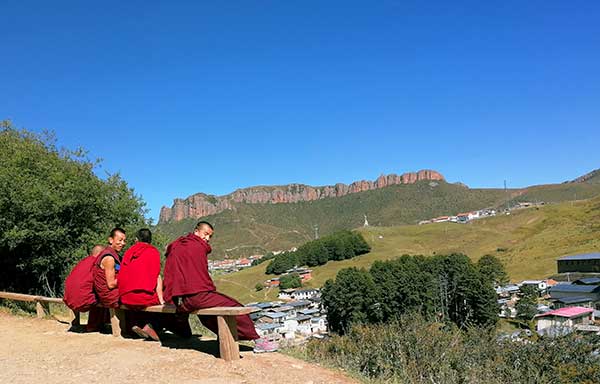
6 days Gansu tour to Binglingsi, Xiahe and Langmusi
Tour type : Private tour Price : from *** Destinations : Lanzhou - linxia - Xiahe - Langmusi - Hezuo - Lanzhou -

12 Days Gansu Highlights Tour
Tour type : Private tour Price : from *** Destinations : Xian – Tianshui – Lanzhou – Xiahe – Langmusi – Hezuo – Zhangye – Jiayuguan - Dunhuang -
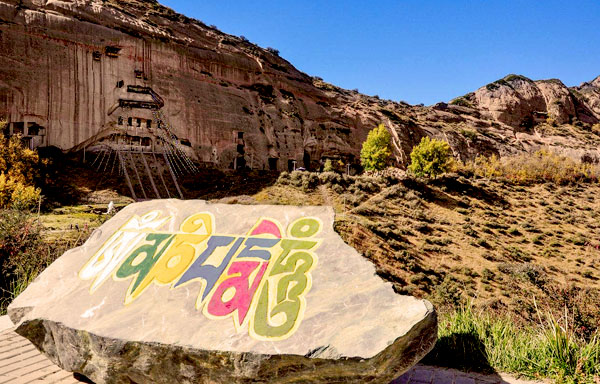
10 Days Silk Road Classic Tour
Tour type : Private tour Price : from *** Destinations : Xian - Zhangye - Jiayuguan - Dunhuang - Turpan - Urumqi -

5 Days Zhangye - Alxa youqi Highlights Tour
Tour type : Private Tour Price : from *** Destinations : Zhangye - Alax youqi - Zhangye

